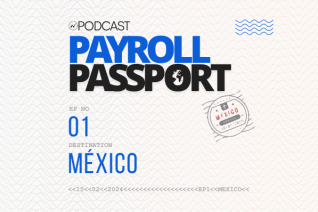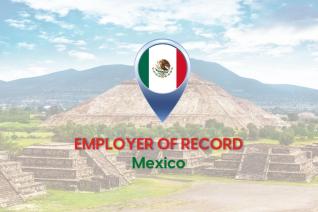Establish your presence globally with Neeyamo as we help you go beyond borders to manage your international payroll services and hire new talent in Mexico.
Overview
Mexico, whose street food is popularly celebrated all over the globe, is renowned for its cultural history and diverse cuisine. The country is also celebrated for its diversity in types of corn. Mexico produces 59 different varieties of native corn, all 59 of which are part of the country's identity. Similar to the diversity found in the types of corn, the country also boasts an incredibly diverse and skilled workforce.
Do your organization’s expansion plans require you to hire employees in Mexico? Do you lack a physical entity in the country – a key requisite to hire local talent? Neeyamo's Global Payroll Services assists organizations worldwide with onboarding and managing employees in Mexico - processing payroll, managing local compliance requirements, benefits, and more.
Our Presence
Tools And Instances
Facts And Stats
Capital
Mexico City
Currency
Mexican Peso (MXN)
Official Language
Spanish
Fiscal Year
1 January - 31 December
Date Format
DD/MM/YYYY
Country Calling Code
+52
Time Zone
UTC-05:00
Global Payroll
Overview
Payroll: Meaning
Payroll means the list of compensation to be paid to employees of a company or organization for a set period or date. Global payroll companies allow organizations to outsource their payroll, allowing employers to focus on other aspects of their business.
Handling payroll for a widespread workforce can pose a significant challenge for any organization, and the added complication of compliance can worsen things. If companies spend more time processing payroll, it directly impacts day-to-day operations and their overall productivity.
Over the years, Neeyamo Global Payroll Solutions has observed these complexities and strived to provide a global payroll solution through a single technology platform - Neeyamo Payroll. Neeyamo's global payroll system eases the process for companies looking for outsourced payroll providers and aids them in manoeuvring the tricky payroll system in Mexico. Neeyamo's payroll software provides affordable payroll services and the perfect solution for all your global payroll needs – for employees working in primary geographies, the long-tail region, remote or internationally located.
How is payroll calculated?
Neeyamo acts as your personalized Payroll Calculator. Ensuring adherence to local regulatory requirements using multi-level controls. Providing timely and accurate payroll, courtesy of our experts worldwide and using a tech-based integrated smart helpdesk solution with seamless support experience manned by payroll experts - Neeyamo covers all your payroll needs.
Payroll Taxes
Payroll tax is the percentage amount retained from an employee's salary and paid to the government to invest in the general population's welfare. These are statutory in nature and are levied from both the employer and employee. Additional statutory contributions are made by employers towards aiding both short-term and long-term benefits for their employees.
Employee Taxes
The employee taxes in Mexico are computed as follows:
Employee Payroll Contributions
| Social Security contributions (IMSS) (Maximum annual contribution 23,804 MXN) | 1.65% |
| Retirement/Old age insurance | 1.125% |
| Total Employee Cost | 2.775% |
Employee Income Tax
In Mexico, the income tax slabs are made as follows:
| Up to 7,735.00 MXN | 1.92% |
| 7,735.00 MXN - 65,651.07 MXN | 6.40% |
| 65,651.07 MXN - 115,375.90 MXN | 10.88% |
| 115,375.90 MXN - 134,119.41 MXN | 16.00% |
| 134,119.41 MXN - 160,577.65 MXN | 17.92% |
| 160,577.65 MXN - 323,862.00 MXN | 21.36% |
| 323,862.00 MXN - 510,451.00 MXN | 23.52% |
| 510,451.00 MXN - 974,535.03 MXN | 30.00% |
| 974,535.03 MXN - 1,299,380.04 MXN | 32.00% |
| 1,299,380.04 MXN - 3,898,140.12 MXN | 34.00% |
| Over 3,898,140.12 MXN | 35.00% |
Most Mexican states levy a relatively low tax on salaries and other income earned by employees, which is payable by the employer; for example, Mexico City imposes a 3% payroll tax.
Employer Taxes
The employer taxes in Mexico are as follows:
| Social Security contributions (IMSS) (Maximum annual contribution 166,174 MXN) | 26.54% - 33.58% |
| Retirement | 5.15% |
| National Housing Fund (INFONAVIT) | 5.00% |
| Total Employment Cost | 36.69 – 43.72% |
Payroll Cycle
Overview
Undoubtedly, payroll is a critical process for any organization. The pay cycle in Mexico refers to the period for which an organization pays its employees, and this can vary depending on the pay frequency that the organization chooses to adopt.
Frequency
According to Mexican Labor Law, payments could be weekly, bi-weekly or monthly but usually, the payroll cycle is bi-weekly, and employees are generally paid on the 15th and the last day of each month.
13th Month Cycle
A 13th-month salary payment is mandatory in Mexico. It is a bonus payment paid by December 20th (Aguinaldo). The Aguinaldo is calculated as 15 working days of salary plus an allowance, based on a 365-day year.
Global Work
Overview
An Employer of Record services provider helps you eliminate the hassle of handling complexities while onboarding a new employee in an international location. They help bridge the gap that otherwise mandates organizations to have a local registered entity and a local bank account, prior to making a job offer to an international hire.
An international employer of record / EOR services provider acts as a legal employer, facilitates salary payments, and manages other statutory requirements such as health insurance, payroll taxes, and employee benefits, ensuring compliance with local tax laws and regulations.
This allows organizations to focus on collaborating with the employee in Mexico for operational tasks, with the knowledge that they have a cost-effective solution like Neeyamo to support their employer of record, business payroll services, and HR requirements, as they continue their global expansion.
Neeyamo, being a cloud-based HR and payroll company providing one of the best HRIS and payroll software solutions, strives to provide its customers with a seamless employee management experience and offers global payroll compliance and EOR aspects with our Global Payroll Technology Stack.
HR Mandates and Practices
Minimum Wage
- Northern Borderfree Zone - 440.87 MXN per day (13,409.80 MXN per month)
- General Minimum Wage Zone - 315.04 MXN per day (9,582.47 MXN per month)
Overtime
Work shifts may be extended due to extraordinary circumstances but may not exceed three hours per day, nor three times a week, for a maximum of 9 hours per week.
Data Retention Policy
There is no legislation that defines how long labor files must be kept; however, in the event of an employee's claim, it is advisable to have a physical file handy.
Hiring and Onboarding Requirements
Hiring
Hiring of employees: Preferences and discrimination.
Under equal circumstances, employers are required to give preference in hiring to:
- Mexicans over foreign nationals (only 10 percent of the employees of a single employer can be foreign nationals);
- Employees with more seniority;
- Individuals who are economically responsible for their families and whose employment is their sole source of income;
- Individuals who have completed the obligatory basic education;
- Trained individuals;
- Individuals with the skills and knowledge required for the job; and
- Unionized employees
The Federal Labour Law expressly prohibits discrimination in the workplace based on ethnic origin, citizenship, gender, age, disability, social status, health conditions, religion, opinions, sexual preference, marital status, or any other circumstance against human dignity, and it prohibits sexual harassment in the workplace.
Further, the Anti-Discrimination Law may come into play if an individual believes he or she has been discriminated against in an employment setting.
Onboarding
While onboarding an employee in Mexico, there are two types of documents that can be requested – Mandatory and optional.
The Mandatory documents are
- RFC(Registro Federal de Contribuyentes)-Mexican tax identification number issued by tax administration services
- CURP(Clave Única de Registro de Población)-Unique identity code
- IMSS number (Instituto Mexicano del Seguro Social)
- INE(Instituto Nacional Electoral) official ID or Passport
- Proof of address(any utility bill, not older than 3 months)
- Bank statement indicating account number and CLABE
- FOR FOREIGNERS ONLY: work permit
- Proof document Fiscal Situation SAT(Servicio de Administración Tributaria)- is the revenue service of the Mexican federal government
The optional documents are
- Resume
- Marriage Certificate
- Certificate of studies completed
- Digital Photograph
- Birth certificate
- Housing fund withholding statement
Probation
The probationary period in Mexico may not exceed 180 days for employees performing leadership and management positions.
For base-level employees, a 30 day probation period is given.
Leave
Public Holiday
There are eight public holidays in Mexico
- Jan 1: New Year's Day
- Feb 5: Constitution Day
- Mar 20: Benito Juarez's Birthday Memorial
- Apr. 6: Holy Thursday
- Apr. 7: Good Friday
- May 1: Labor Day/May Day
- 16 Sep: Independence Day
- 02 Nov: All Souls Day
- 20 Nov: Revolution Day
- 25 Dec: Christmas Day
Annual Leave:
On November 3, 2022, the Mexican Senate approved the "Decent Vacations" initiative, which will come into effect on January 1, 2023.
The initiative amends the Federal Labor Law to increase annual leave from six to twelve days in the first year of employment, and by two days each year thereafter.
Annual leave will be increased by two days every five years, beginning with the sixth work anniversary. All employees, both existing and new, will be affected by the change.
Year worked: Vacation Days
1 Year: 12 Days
2 Years: 14 Days
3 Years: 16 Days
4 Years: 18 Days
5 Years: 20 Days
6 to 10 Years: 22 Days
11 to 15 Years: 24 Days
Sick Leave
No minimum days are required by the law.
When the worker is disabled due to illness, it is not possible to terminate him by law.
If an employee is unable to work because of a non-work-related injury or illness and has made payments into the social security system for 4 weeks before the condition developed, then they are eligible for paid sick leave through the Social Security Institute.
The benefit, which is 60 percent of an employee’s regular wage, is paid from the fourth day of the illness for up to 52 weeks and may be extended for another 52 weeks.
Paternity Leave
Male employees are entitled to enjoy a paid paternity leave of 5 days when the child is born.
Maternity Leave
Maternity Leave will be 12 weeks, 6 weeks before the child is born, and 6 weeks after birth.
Working mothers may request the employer transfer up to 4 weeks of pregnancy leave in order to enjoy them after childbirth via agreement.
In case the children were born with any type of disability or require care in a hospital, the rest may be up to 8 weeks after delivery, granted after submission of a medical certificate.
When an employee returns from maternity leave, the employee is entitled to her employment, provided that no more than one year has passed since the date of delivery.
Pay - During maternity leave, the Mexican Social Security Institute will pay the working mother 100% of her daily salary as a social security contribution.
If the maternity leave period is extended, she is entitled to 50% of the daily salary of social security contribution for a period of up to 60 days.
Other Leave
Adoption Leave:
In Mexico, for adoption, the mother is entitled to six weeks of paid leave from the day she receives the child. The father is entitled to five working days.
Care Leave for Parents with Children with Cancer:
Care leave is given to insured working mothers or fathers whose children of up to sixteen years of age have been diagnosed with cancer of any kind by the Mexican Institute of Social Security. The care leave certificate issued by the IMSS to the insured father or mother shall be valid for up to 28 days. IMSS can issue as many certificates as needed within a period of three years, but the employee’s leave cannot exceed 364 days in total. The insured, working parent will enjoy a subsidy equivalent to 60% of the last contribution base salary registered by the employer with the IMSS, provided that the employee has at least 30 weekly statutory social security contributions covered in the 12-month period prior to the date of the diagnosis. If that standard is not met, the employee seeking leave must have at least 52 immediate weekly statutory social security contributions prior to the start of the care leave. In no case will this leave be granted to both working parents.
Disability leave:
Occupational Injuries:
It is defined as any accident or disease to which the employees are exposed in the course of their employment.
Industrial accident (Work Accident Leave/Accident Journey Leave):
It is defined as any organic injury, functional disturbance, whether immediate or subsequent, or l security.
Occupational Diseases:
It is defined as any pathological condition arising out of the continued action of a cause that has its origin or motive in the employment or in the environment in which the employee is obliged to render his services. The economic benefits paid due to illness are based on 60% of the employee’s registered salary, and they are paid as of the fourth day of absence.
Leave Without Pay:
It is not statutory leave; It is an agreement between the employer and the employee based on the company policy
The leave allows the employee to be absent for a more or less prolonged period but without receiving a salary.
Termination
Notice Period
There are no statutory minimum notice periods in Mexico; however, Federal Labour Law states that should the circumstance dictate, the company must provide the employee with notice in writing within 30 days of knowing about the misconduct.
The written notice must explain the grounds for dismissal, or the Labor Board must issue a termination notice.
Severance Pay
Voluntary resignation: the employer must pay the employee all benefits that are due. In case the employee has 15 years or more of seniority in the organization, the employee is entitled to 12 days’ salary for each year employed.
Termination with cause: The employer must pay the employee all benefits that are due, in addition to 12 days of salary for each year employed.
Termination without cause: 3 month’s salary, 20 days for each year in the company, and a seniority bonus of 12 days per year of service. The employee should also receive back salary from the date of dismissal to the day that the employer complies with the Labor Board’s decision.
Visa
Overview
Any foreigners coming to work in Mexico will need to apply for a work permit and resident visa.
The National Institute of Immigration oversees all immigration in Mexico and issues work visas.
Mexico has a temporary and permanent visa; the employee should apply for both jointly with the prospective employer.
A temporary resident visa is for foreign nationals who want to live in Mexico for more than 180 days. In addition to the Mexico work permit, people with a temporary resident visa can live and work in the country for up to four years with a Mexico work visa.
After completing four years’ service (with the same company), a foreigner may apply for a permanent resident visa.
Employee Background Checks
Legal and Background Checks
Employers are not strictly forbidden or limited by Mexican law from requesting a criminal record certificate or conducting background checks (also known as credit checks).
Contrarily, the Mexican Federal Law on the Protection of Personal Data Held by Private Parties (the "Data Privacy Law") regulates the lawful, controlled, and informed handling of personal data in order to protect the privacy of the individual and their right to decide who, why, and for what purposes their personal data may be processed (informational self-determination).
Every time personal data is processed, there is a reasonable expectation of privacy, which is defined as the trust one person places in another with regard to the information they have provided about themselves.
Criminal and financial/economic data are regarded as secret information under the Data Privacy Law; any violation of this obligation may result in civil and/or criminal punishment. Furthermore, according to the law, financial and economic information is considered "sensitive data" and needs the express approval of the "data owner" (in this case, the employee).
Delivering a Privacy Notice containing the purposes of data processing and express authorization for the processing of sensitive data by the "data owner" (the employer) to each employee or incumbent upon acknowledgment of receipt is one important requirement that employers must adhere to when collecting employees' or incumbents' personal data.
Employer may terminate employee for use of false documentation to secure employment, which is applicable only within the first 30 days of service.
Last updated on December 15, 2025
If you have any queries or suggestions, reach out to us at irene.jones@neeyamo.com
Have Queries? Get In Touch With Us
Get in touch with one of our experts and take a quick demo of our services












